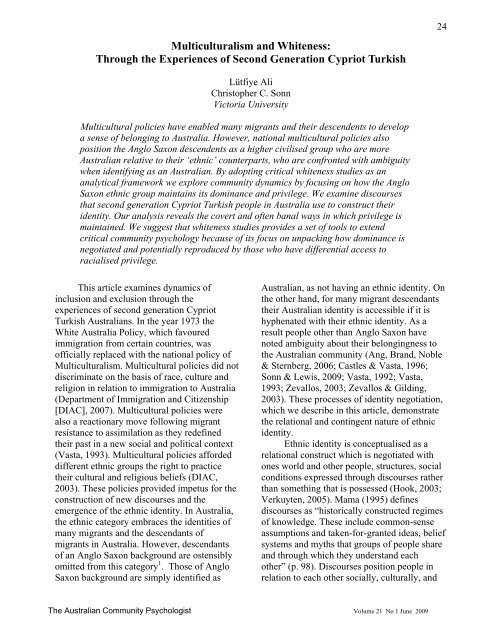issue 1 09 - APS Member Groups - Australian Psychological Society
issue 1 09 - APS Member Groups - Australian Psychological Society
issue 1 09 - APS Member Groups - Australian Psychological Society
Create successful ePaper yourself
Turn your PDF publications into a flip-book with our unique Google optimized e-Paper software.
24Multiculturalism and Whiteness:Through the Experiences of Second Generation Cypriot TurkishLütfiye AliChristopher C. SonnVictoria UniversityMulticultural policies have enabled many migrants and their descendents to developa sense of belonging to Australia. However, national multicultural policies alsoposition the Anglo Saxon descendents as a higher civilised group who are more<strong>Australian</strong> relative to their ‘ethnic’ counterparts, who are confronted with ambiguitywhen identifying as an <strong>Australian</strong>. By adopting critical whiteness studies as ananalytical framework we explore community dynamics by focusing on how the AngloSaxon ethnic group maintains its dominance and privilege. We examine discoursesthat second generation Cypriot Turkish people in Australia use to construct theiridentity. Our analysis reveals the covert and often banal ways in which privilege ismaintained. We suggest that whiteness studies provides a set of tools to extendcritical community psychology because of its focus on unpacking how dominance isnegotiated and potentially reproduced by those who have differential access toracialised privilege.This article examines dynamics ofinclusion and exclusion through theexperiences of second generation CypriotTurkish <strong>Australian</strong>s. In the year 1973 theWhite Australia Policy, which favouredimmigration from certain countries, wasofficially replaced with the national policy ofMulticulturalism. Multicultural policies did notdiscriminate on the basis of race, culture andreligion in relation to immigration to Australia(Department of Immigration and Citizenship[DIAC], 2007). Multicultural policies werealso a reactionary move following migrantresistance to assimilation as they redefinedtheir past in a new social and political context(Vasta, 1993). Multicultural policies affordeddifferent ethnic groups the right to practicetheir cultural and religious beliefs (DIAC,2003). These policies provided impetus for theconstruction of new discourses and theemergence of the ethnic identity. In Australia,the ethnic category embraces the identities ofmany migrants and the descendants ofmigrants in Australia. However, descendantsof an Anglo Saxon background are ostensiblyomitted from this category 1 . Those of AngloSaxon background are simply identified as<strong>Australian</strong>, as not having an ethnic identity. Onthe other hand, for many migrant descendantstheir <strong>Australian</strong> identity is accessible if it ishyphenated with their ethnic identity. As aresult people other than Anglo Saxon havenoted ambiguity about their belongingness tothe <strong>Australian</strong> community (Ang, Brand, Noble& Sternberg, 2006; Castles & Vasta, 1996;Sonn & Lewis, 20<strong>09</strong>; Vasta, 1992; Vasta,1993; Zevallos, 2003; Zevallos & Gilding,2003). These processes of identity negotiation,which we describe in this article, demonstratethe relational and contingent nature of ethnicidentity.Ethnic identity is conceptualised as arelational construct which is negotiated withones world and other people, structures, socialconditions expressed through discourses ratherthan something that is possessed (Hook, 2003;Verkuyten, 2005). Mama (1995) definesdiscourses as “historically constructed regimesof knowledge. These include common-senseassumptions and taken-for-granted ideas, beliefsystems and myths that groups of people shareand through which they understand eachother” (p. 98). Discourses position people inrelation to each other socially, culturally, andThe <strong>Australian</strong> Community Psychologist Volume 21 No 1 June 20<strong>09</strong>
















